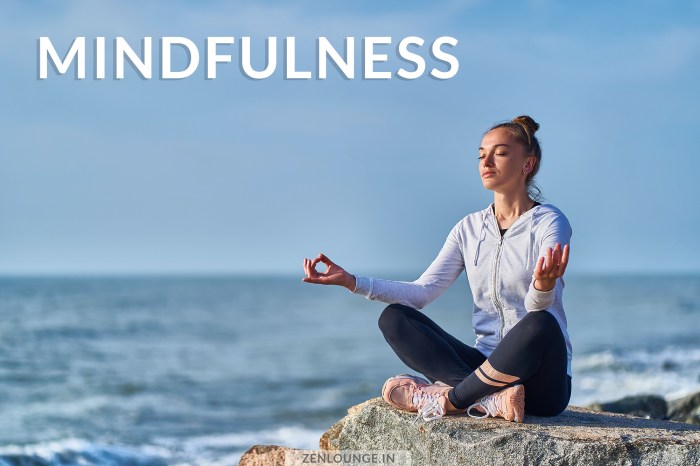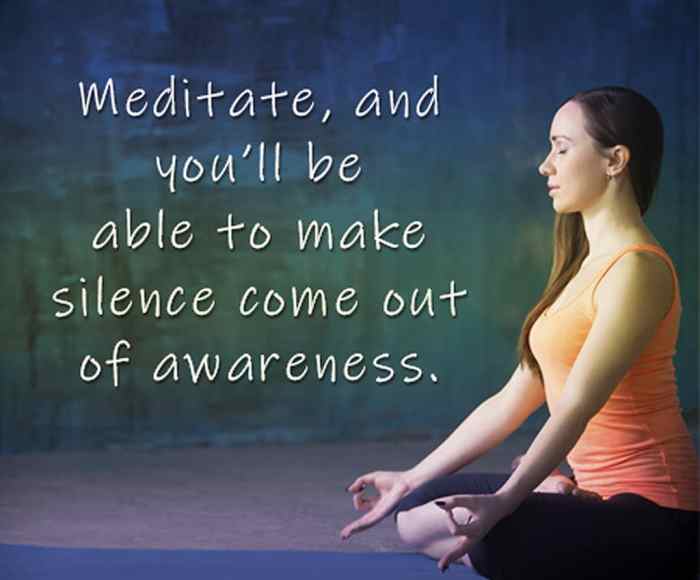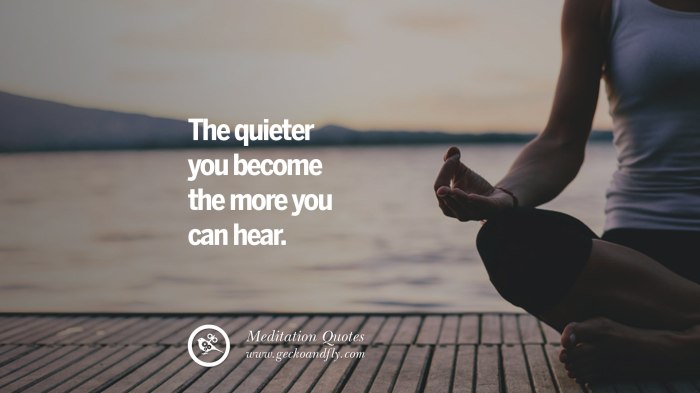How to Meditate for Unlocking the Power of Your Breath sets the stage for delving into the profound connection between meditation and breathwork, offering a transformative journey towards mental clarity and relaxation.
Embark on a path of self-discovery as we explore the intricacies of breath meditation and its ability to unlock hidden potential within.
Introduction to Meditation and Breathwork

Meditation is a powerful practice that has been used for centuries to enhance overall well-being. It allows individuals to cultivate mindfulness, reduce stress, and improve their mental clarity. One crucial aspect of meditation is the focus on the breath, which serves as an anchor to the present moment and helps in achieving a state of relaxation and awareness.
Importance of Meditation in Enhancing Overall Well-being
When we engage in regular meditation, we create space for self-reflection and introspection. This practice enables us to connect with our inner selves, calm our minds, and reduce anxiety and negative thinking patterns. By incorporating meditation into our daily routine, we can experience improved emotional balance, increased focus, and a greater sense of peace.
Connection Between Meditation and Breathwork
The connection between meditation and breathwork lies in the fundamental role of the breath as a central focus during meditation practice. By directing our attention to the breath, we can regulate our thoughts and emotions, leading to a deeper sense of relaxation and mindfulness. The breath acts as a bridge between the mind and body, allowing us to synchronize our physical and mental states.
Benefits of Incorporating Breathwork into Meditation Practices, How to Meditate for Unlocking the Power of Your Breath
- Enhanced Relaxation: Deep breathing techniques used in breathwork can promote relaxation by activating the body’s natural relaxation response.
- Improved Focus: Focusing on the breath during meditation enhances concentration and helps in cultivating mindfulness.
- Stress Reduction: Breathwork can help in reducing stress levels by calming the nervous system and promoting a sense of tranquility.
- Emotional Regulation: Incorporating breathwork into meditation practices can assist in managing emotions and fostering emotional resilience.
Understanding the Power of Breath in Meditation

Breath is a fundamental aspect of meditation practice, serving as a bridge between the mind and body. Focusing on the breath can significantly enhance the meditative experience, leading to a deeper sense of relaxation and mental clarity.
Need to relax and unwind? Practice How to Meditate with Your Breath for Ultimate Relaxation to soothe your mind and body.
Physiological Effects of Mindful Breathing
- Mindful breathing activates the parasympathetic nervous system, promoting relaxation and reducing stress levels.
- Deep breathing increases oxygen flow to the brain, improving cognitive function and overall mental well-being.
- Regulating the breath can help lower blood pressure and heart rate, promoting a sense of calmness and tranquility.
Psychological Effects of Mindful Breathing
- By focusing on the breath, individuals can cultivate present-moment awareness, reducing rumination and promoting mindfulness.
- Breath awareness can help in developing emotional regulation skills, allowing practitioners to respond to situations with greater equanimity.
- Consistent breathwork can improve concentration and attention span, enhancing overall cognitive performance.
Benefits of Breath Awareness for Mental Clarity and Relaxation
- Practicing breath awareness can help in calming the mind, reducing mental chatter, and promoting a sense of inner peace.
- Deep, intentional breathing can release tension in the body, leading to physical relaxation and a sense of ease.
- By honing in on the breath, individuals can access a state of heightened awareness and clarity, facilitating introspection and self-discovery.
Techniques for Meditating to Unlock Breath Power

When it comes to unlocking the power of your breath through meditation, there are various techniques that can help you deepen your practice and experience the benefits of focused breathing. Here, we will explore some step-by-step methods to start a basic meditation practice, different breathing techniques like diaphragmatic breathing and alternate nostril breathing, as well as tips to maintain focus on the breath during meditation.
Are you feeling stuck with mental blockages? Learn How to Meditate for Releasing Mental Blockages and free your mind from obstacles.
Starting a Basic Meditation Practice
- Find a quiet and comfortable place to sit or lie down.
- Closing your eyes, bring your attention to your breath without trying to change its rhythm.
- Start by taking slow, deep breaths, focusing on the sensation of air moving in and out of your body.
- Allow any distracting thoughts to pass without judgment, gently returning your focus to the breath.
- Continue this practice for a few minutes to start, gradually increasing the duration as you become more comfortable.
Diaphragmatic Breathing
Diaphragmatic breathing, also known as belly breathing, involves engaging the diaphragm to take deep breaths that fully expand the lungs. This technique can help reduce stress and improve oxygen flow in the body.
Struggling to let go of the past? Discover How to Meditate for Releasing the Past and Moving Forward to find peace and move ahead.
Alternate Nostril Breathing
Alternate nostril breathing is a yogic breathing technique that involves breathing through one nostril at a time to balance the flow of energy in the body. It can help calm the mind, reduce anxiety, and enhance focus.
Maintaining Focus on the Breath
- Set a specific time each day for your meditation practice to establish a routine.
- Use a timer to help you stay on track and avoid checking the clock during meditation.
- If your mind wanders, gently guide your focus back to the sensation of breathing without self-criticism.
- Experiment with different breathing techniques to find what works best for you and enhances your meditation experience.
Exploring Advanced Breathwork Practices

Breathwork practices like box breathing and kapalabhati can take your meditation to the next level by enhancing focus, calming the mind, and increasing energy levels. Understanding the role of breath retention (kumbhaka) and integrating pranayama techniques can further unlock the power of your breath in meditation.
Box Breathing
- Box breathing involves inhaling, holding the breath, exhaling, and holding the breath again in equal counts.
- This technique helps regulate the breath, reduce stress, and improve concentration during meditation.
- Try inhaling for a count of 4, holding for 4, exhaling for 4, and holding again for 4 to experience the benefits of box breathing.
Kapalabhati Breathing
- Kapalabhati is a powerful breathing technique that involves forceful exhalations followed by passive inhalations.
- This practice helps cleanse the respiratory system, increase oxygenation, and invigorate the mind and body.
- Start with a few rounds of kapalabhati breathing and gradually increase the pace as you become more comfortable with the practice.
Breath Retention (Kumbhaka)
- Kumbhaka, or breath retention, involves holding the breath after inhaling or exhaling for a specific duration.
- This practice enhances lung capacity, improves focus, and promotes relaxation by allowing the body to absorb more oxygen.
- Integrate kumbhaka into your meditation by incorporating breath holds at the end of inhalations or exhalations to deepen your practice.
Integration of Pranayama Techniques
- Pranayama techniques, such as alternate nostril breathing and ujjayi breath, can be seamlessly integrated into meditation to enhance breath awareness and control.
- By combining pranayama with meditation, you can unlock the full potential of your breath, cultivate inner peace, and tap into a deeper sense of self-awareness.
- Experiment with different pranayama techniques during your meditation practice to find what resonates best with you and supports your breathwork journey.
Incorporating Mindfulness into Breath Meditation: How To Meditate For Unlocking The Power Of Your Breath

Mindfulness is the practice of being fully present and aware of your thoughts, feelings, sensations, and surroundings without judgment. When combined with breath meditation, mindfulness can deepen your practice and enhance its benefits.
Cultivating Mindfulness through Breath Awareness
One way to cultivate mindfulness through breath awareness is to focus all your attention on the sensation of breathing. Notice the rise and fall of your abdomen or the feeling of air entering and exiting your nostrils. Whenever your mind starts to wander, gently bring your focus back to your breath without criticizing yourself.
- Practice deep breathing exercises to connect with the present moment and anchor your awareness in the now.
- Use counting techniques, such as counting each inhale and exhale, to stay focused and prevent distractions.
- Observe the quality of your breath without trying to change it, accepting it as it is in the present moment.
Impact of Mindfulness on Well-being and Stress Reduction
Mindfulness can have a profound impact on your overall well-being and stress levels. By cultivating mindfulness through breath meditation, you can:
- Reduce anxiety and increase feelings of calmness and relaxation.
- Improve your ability to cope with stress and challenging situations.
- Enhance your focus, concentration, and cognitive abilities.
- Promote emotional regulation and self-awareness.
In conclusion, mastering the art of breath meditation not only enhances overall well-being but also paves the way for a harmonious union of mind, body, and soul. Embrace the power of your breath and unlock a world of serenity and inner peace.